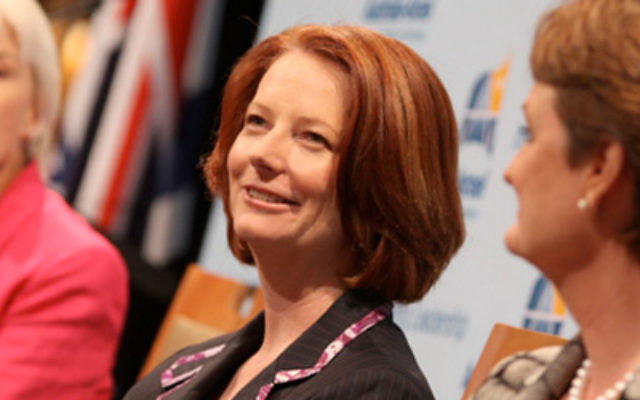Australia’s UN abstention: a bitter blow
THE Gillard government this week announced it would abstain from a United Nations vote on whether the Palestinian territories should be granted observer status, amid reports of a deep party divide on the issue.
THE Gillard government this week announced it would abstain from a United Nations vote on whether the Palestinian territories should be granted observer status, amid reports of a deep party divide on the issue.
Prime Minister Julia Gillard is understood to have made the decision to vote against the bid, but was reportedly scuppered by her own party amid threats of a caucus revolt.
Federal MP Michael Danby insisted the Labor Party maintained its support for a two-state solution and did not support the current UN process for achieving Palestinian statehood, but admitted “the intense political activity of the past few days has been a setback for supporters of Israel”.
He praised the Prime Minister, ministers Bill Shorten and Stephen Conroy, together with parliamentary secretaries Mark Dreyfus, David Feeney, Don Farrell and Bernie Ripoll, who “stood staunchly by us”.
“The Jewish community should be particularly disappointed with ministers [Simon] Crean and Stephen Smith, who did not support the Prime Minister on the pro-Israel position at this crucial juncture,” he said.
Foreign Affairs Minister Bob Carr’s office confirmed to The AJN yesterday that he had been in favour of an abstention, amid reports it was he who rallied the Labor factions to support the move.
Speaking on ABC Radio on Tuesday, Carr said the abstention had not been the result of a party compromise.
“This has become widely seen as a referendum on the idea of a Palestinian state and if we voted ‘no’ it would be widely interpreted as us not supporting Palestinian nationhood in any context,” he said.
Opposition Leader Tony Abbott told The AJN he “deplored this apparent weakening in what has, up until now, been a 60-year record of staunch support for Israel”.
“The Australian government should make support of Palestinian observer status at the UN conditional on the Palestinians’ unconditional and unambiguous acceptance of Israel’s right to exist behind secure borders,” he said.
Shadow foreign minister Julie Bishop said the opposition was concerned the Palestinian UN push was an attempt by Palestinian leaders to enable them to bring action against Israel through the international courts.
Community leaders also expressed their disappointment over the proposed abstention.
The Australia/Israel & Jewish Affairs Council (AIJAC) said the government had made the correct decision not to support the motion, but added it was “unfortunate that a principled ‘no’ vote – which would have been even more appropriate – did not prove possible on this occasion”.
Explaining why the UN vote was detrimental, the AIJAC statement read: “The expected vote will be a setback for peace because the PA move not only distracts from the urgent need to restart direct negotiations on a two-state resolution and provides Palestinians with a damaging and fruitless hope that they can advance their agenda without the need for negotiations or compromise, but is also a material breach of the Oslo Accords.”
Executive director of the Executive Council of Australian Jewry Peter Wertheim said: “Australia’s decision to abstain in these circumstances weakens our long-standing support for a viable and binding system of international law, and Australia’s consistent efforts to encourage a negotiated two-state Israeli-Palestinian peace.”
Zionist Federation of Australia president Philip Chester added: “This unilateral move by the Palestinians will not progress their aim of statehood, but will instead create more mistrust and lack of confidence between Israel and the Palestinians.”
GARETH NARUNSKY
Prime Minister Julia Gillard, pictured here at a 2010 Australia-Israel Chamber of Commerce function, faced a party revolt if she rejected the Palestinian Authority’s UN push.


comments